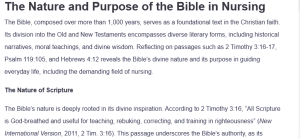The Nature and Purpose of the Bible in Nursing
The Bible, composed over more than 1,000 years, serves as a foundational text in the Christian faith. Its division into the Old and New Testaments encompasses diverse literary forms, including historical narratives, moral teachings, and divine wisdom. Reflecting on passages such as 2 Timothy 3:16-17, Psalm 119:105, and Hebrews 4:12 reveals the Bible’s divine nature and its purpose in guiding everyday life, including the demanding field of nursing.
The Nature of Scripture
The Bible’s nature is deeply rooted in its divine inspiration. According to 2 Timothy 3:16, “All Scripture is God-breathed and useful for teaching, rebuking, correcting, and training in righteousness” (New International Version, 2011, 2 Tim. 3:16). This passage underscores the Bible’s authority, as its teachings originate from a divine source. As a result, its messages are not limited to historical context but extend into the present, providing enduring wisdom and guidance. Likewise, Hebrews 4:12 describes the Bible as “alive and active,” capable of penetrating the deepest aspects of human thoughts and emotions. This characteristic makes the Scripture applicable in many situations; hence, it is relevant even in healthcare, where moral and spiritual direction is required in the handling of complex and difficult situations (Harrad et al., 2019).
The Purpose of Scripture
The Bible’s purpose extends beyond spiritual teaching to offer practical guidance for daily living. As Psalm 119:105 illustrates, the Word serves as a “lamp unto my feet and a light unto my path” (New International Version, 2011, Ps. 119:105), symbolizing the direction and clarity it provides. In nursing, where practitioners often face ethical dilemmas and emotionally charged situations, the Scripture can act as a moral compass. Nurses can become more professional and caring when decisions are based on clear biblical principles that will benefit patients. Besides, the Bible offers valuable lessons of morality that create a good ethical foundation nurses can use in ethical practice.
The Transformative Potential of Scripture
Wayne Cordeiro’s book The Divine Mentor highlights the transformative power of engaging with the Scripture. Cordeiro (2008) compares daily Bible reading to reading from history and receiving guidance from characters in the Bible. This can work as a good practice for nurses since it builds resilience and saves against burnout as it feeds the soul (Cordeiro, 2008). Cordeiro (2008) also prescribes the term “sacred enclosures,” which calls for spiritual practices that would help nurses maintain their spirituality regardless of the status or background of a patient.
The Bible is indeed a unique book with life-giving instructions that remain relevant today. Its timeless principles and moral teachings offer guidance not only for spiritual growth but also for addressing real-life challenges. As demonstrated in 2 Timothy 3:16-17, the Scripture is “God-breathed,” making it a reliable source of truth. Today, these teachings about compassion, patience, and moral behaviors are relevant in the nursing profession (De Ganahl, 2020). Cordeiro (2008) explains how daily communication with the world can provide the possibility of change and strengthen one against adversities while enhancing the personal and professional lives of those in healthcare facilities.
Conclusion
The Bible stands out not only as a sacred text but also as a practical guide that provides life-giving instructions. Its divine nature and purpose support ethical decision-making, resilience, and spiritual well-being. This paper discusses how executive models of identification and implementation of biblical principles in nursing can improve patient care while providing spiritual nourishment to practitioners.
References
Cordeiro, W. (2008). The divine mentor: Growing your faith as you sit at the feet of the savior. Bethany House Publishers.
De Ganahl, A. (2020, October 15). “Scripture is sufficient to sanctify” – 2 Timothy 3:16-17. The Pastor’s Brief. https://www.thepastorsbrief.com/post/scripture-is-sufficient-to-sanctify-2-timothy-3-16-17
Harrad, R., Cosentino, C., Keasley, R., & Sulla, F. (2019). Spiritual care in nursing: An overview of the measures used to assess spiritual care provision and related factors amongst nurses. Acta Bio-Medica: Atenei Parmensis, 90(4-S), 44–55. https://doi.org/10.23750/abm.v90i4-S.8300
The Holy Bible: New International Version (NIV). (2011). Biblica, Inc. (Original work published 1973).
ORDER A PLAGIARISM-FREE PAPER HERE
We’ll write everything from scratch
Question
Getting Started
The Bible is a collection of sacred texts central to the Christian faith, containing a diverse range of literary genres written over a period of more than 1,000 years. It is divided into two main sections, the Old Testament, with 39 books, and the New Testament, with 27 books.
The Old Testament comprises Hebrew scripture, with books such as Genesis, Exodus, Leviticus, and Deuteronomy representing historical narratives and legal codes. Other books, such as the Psalms, Proverbs, and Ecclesiastes, are considered wisdom literature, while the prophetic books, such as Isaiah, Jeremiah, and Ezekiel, contain messages of hope, judgment, and restoration.
The New Testament, written in Greek, consists of four Gospels: Matthew, Mark, Luke, and John, Acts, letters to various early Christian communities, and the apocalyptic Book of Revelation. The Gospels recount the life and teachings of Jesus, while the letters provide instruction and guidance to these new church communities. The Book of Revelation is a highly symbolic and metaphorical work that presents a vision of the ultimate triumph of God.
The Bible remains one of the world’s most widely read and studied texts, with its diverse genres and themes continuing to inspire and guide individuals across cultures and generations.
In this assignment, you will read what the Bible says about itself and respond to what you find.
Upon successful completion of this assignment, you will be able to:
- Identify ways the Old Testament and New Testament writers taught us about the nature and purpose of scripture.
- Describe the benefits of applying scripture to everyday living.
Background Information
You have learned a bit about the different literary genres in the Bible. In this assignment, you will use this information to reflect on what makes the Bible a “holy” book.

The Nature and Purpose of the Bible in Nursing
Instructions
- Review the readings and videos from activity 1.2.
- Read 2 Timothy 3:16-17, Psalm 119:105, and Hebrews 4:12. Reflect on how the genre of each passage impacts the meaning.
- Write a 500 wordreflection on what these verses teach us about the nature and purpose of the Bible. Your reflection should include references to the readings and videos as well as the scripture passages. As you read what the Bible says about itself, are you convinced it is a unique book with life-giving instructions for today?
- Review the rubric to make sure you understand the criteria for earning your grade.
- Submit your paper by Day 7.
Review the associated rubric
Access the assignment submission page


